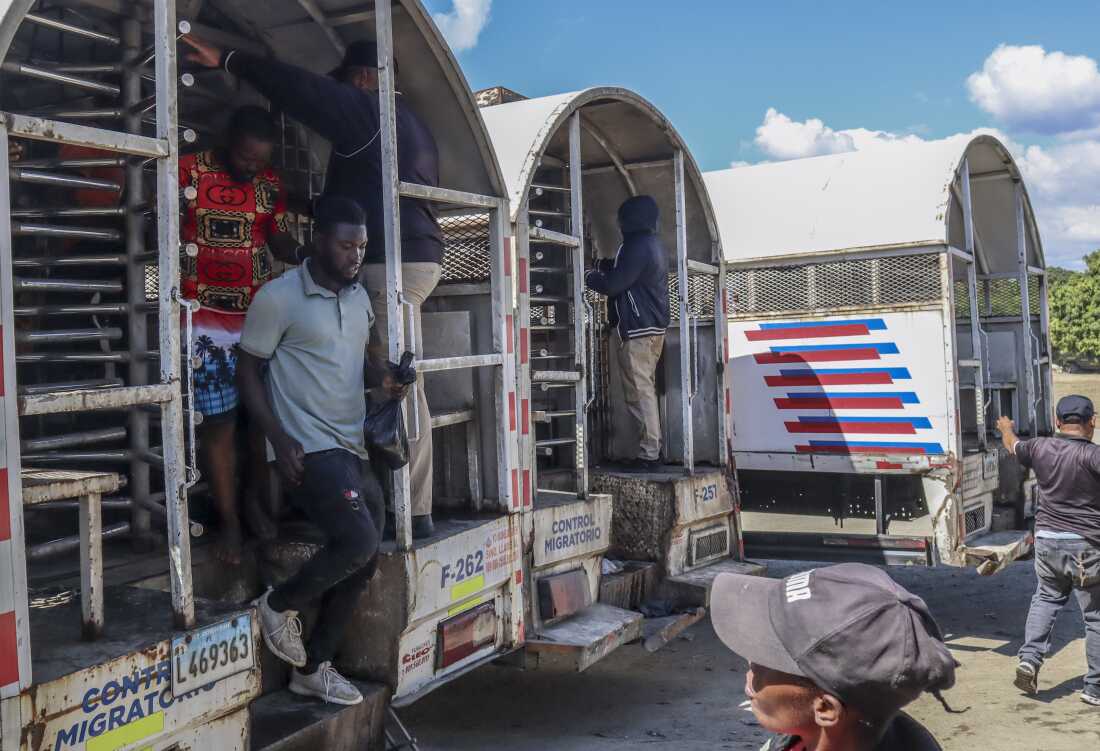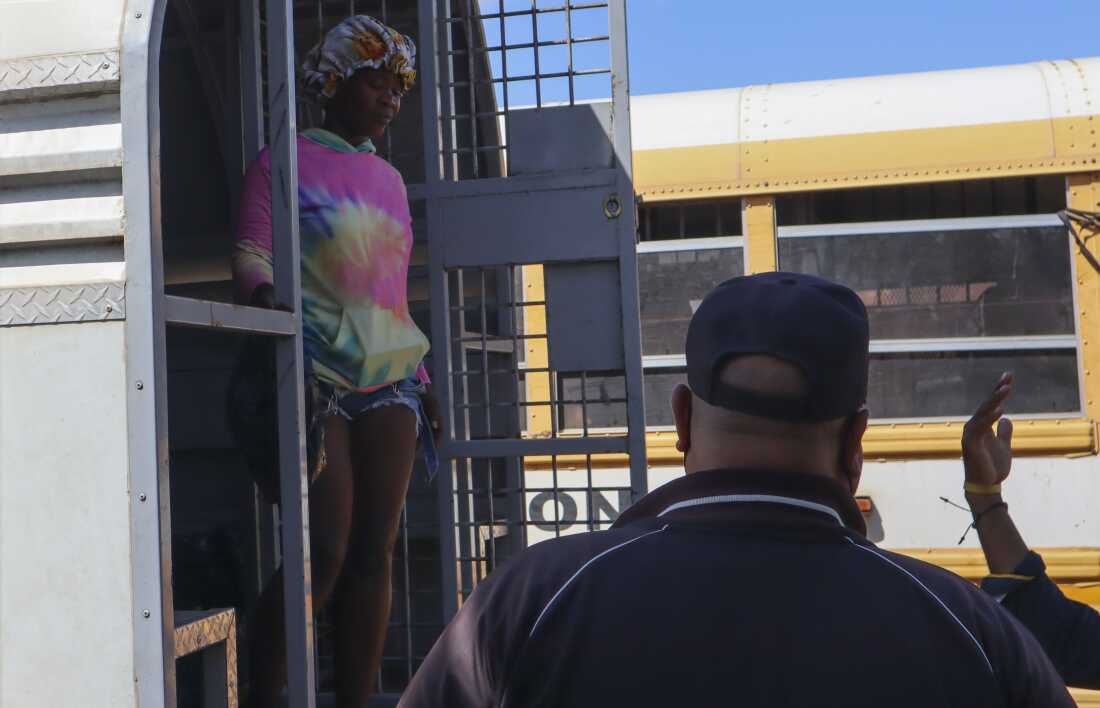Haitian migrants share stories of abuse as Dominican Republic ramps up deportations : NPR

BELLADERE, Haiti — A crowd of 500 descended from dusty trucks on a recent morning and shuffled through a tiny gap in a border gate separating Haiti from the Dominican Republic.

They were the first deportees of the day, some still clad in work clothes and others barefoot as they lined up for food, water and medical care in the Haitian border city of Belladère before mulling their next move.
Under a broiling sun, the migrants recounted what they said were mounting abuses by Dominican officials after President Luis Abinader ordered them in October to start deporting at least 10,000 immigrants a week under a harsh new policy widely criticized by civil organizations.
“They broke down my door at 4 in the morning,” said Odelyn St. Fleur, who had worked as a mason in the Dominican Republic for two decades. He had been sleeping next to his wife and 7-year-old son.
The number of alleged human rights violations ranging from unauthorized home raids to racial profiling to deporting breastfeeding mothers and unaccompanied minors is surging as officials ramp up deportations to Haiti, which shares the island of Hispaniola with the Dominican Republic.
More than a quarter million people were deported last year, and more than 31,200 in January alone.
“The situation has reached a critical point,” said Roudy Joseph, an activist who accused officials of ignoring due process during arrests. “Every day, children are left abandoned at schools.”

Haitians line up at a non-profit help center to receive food after being deported from the Dominican Republic, in Belladere, Haiti on Jan. 30.
Danica Coto/AP
hide caption
toggle caption
Danica Coto/AP
‘I’ll wait for you on the other side’
On a recent afternoon, dozens of vendors lined up on either side of the men, women and unaccompanied children who marched single file into Belladère after being deported, their feet sinking into a muddy, garbage-strewn trail that smelled of urine.
The men tried to sell them jeans, water, SIM cards and illegal trips back to the Dominican Republic: “Would you like to pass through? I’ll wait for you on the other side,” they whispered in Creole.
Despite the crackdown, many re-enter the Dominican Republic, exposing a broken system.
That afternoon marked the second time Jimmy Milien, a 32-year-old floor installer, was deported. He was arrested in the capital, Santo Domingo, in 2024 and again in mid-January when authorities boarded a public bus and pointed at him.
“Damn devil Haitian, get off,” he recalled them saying before they even asked for documents.
He left behind his wife and two children, ages 3 and 12, and doesn’t know when he’ll see them again.
He was planning to travel to Haiti’s capital, but like thousands of others dropped off in Belladère, he would have to cross through gang territory where gunmen open fire on public transport.
“There’s no food, there’s nothing, only criminals,” he said of Haiti, where more than 5,600 people were reported killed last year, the majority by gangs that control 85% of the capital, Port-au-Prince.
If Milien were to return a third time to the Dominican Republic, dozens of smugglers await.
Mack, a Haitian who only gave his first name to speak freely about smuggling, said he ferries migrants across the border up to six times a week.
He charges $3 per person, and then offers $8 to Dominican border guards: “If you pay them, they will let you through,” he said.
He lived almost three years in Santo Domingo, installing drywall until he got deported. He then joined a thriving smuggling operation and said he doesn’t plan on returning to the capital until the crackdown eases.
“Here, everyone knows me,” he said. “They don’t bother me.”

Haitians deported from the Dominican Republic get out of trucks in Carrizal, Dominican Republic, on the border with Haiti on Jan. 30.
Martin Adames/AP
hide caption
toggle caption
Martin Adames/AP
Young and alone at the border
Military checkpoints dot the road leading out of the dusty border to the Dominican capital. Authorities board buses, stick their heads into car windows and detain suspected undocumented migrants, but many jump out before a checkpoint and hop on again further down the road.

The influx of Haitian migrants and their attempts to re-enter illegally is something that vexes Vice Admiral Luis Rafael Lee Ballester, Dominican migration director.
“The Dominican Republic…has taken too much responsibility for the situation in Haiti,” he said. “We are willing to provide support, but it’s important that Haiti’s leaders instill order in their country, that they look after their people.”
Dominican officials argue that Haitian immigrants have overburdened the country’s public services, with more than 80,000 new Haitian students enrolled in public schools in the past four years. Health officials say Haitian women account for up to 70% of births in the country, costing the government millions of dollars.
Ballester said he will deploy additional migration officials across the country to tackle what he described as a surge in undocumented immigrants, saying they’re a burden and a danger to his country.
While he denied abuse allegations, he acknowledged officials are allowed to enter homes “during a hot pursuit” and that personnel are being retrained “because our commitment to respecting human rights is unquestionable.”
Ballester said the Dominican Republic does not deport unaccompanied minors and that officials now separate women and children from men during deportations.
But in late January, five teenagers without their parents were deported. Among them was Jovenson Morette, 15, who said he was detained while working in a field.
He and the four others were interviewed by Haitian officials in Belladère who were trying to track down their parents.
Further north, in the Haitian border town of Ouanaminthe, a 10-year-old unaccompanied girl was deported in late January, said Geeta Narayan, UNICEF’s representative in Haiti.
“These children are amongst the most vulnerable,” she said, noting that gangs along the border prey on them.
Last year, the Dominican Republic deported 1,099 unaccompanied children; 786 of them were reunited with their families, according to UNICEF.
Josette Jean, 45, feared for her 16-year-old son, who was born in the Dominican Republic, when he was recently deported alone to Haiti.
Clutching a picture of him, she said she rushed to the Dominican detention center where he was being held but was told the government doesn’t deport unaccompanied minors. He was deported anyway.
Jean paid a smuggler to bring her son back to the Dominican Republic days later.
“Children who are born here have no idea where to go,” she said of those deported to Haiti, a country her son had never visited.
A significant number of those deported, like Jean’s son, were born in the Dominican Republic but lack birth certificates or other official documentation proving their legal status, with activists accusing the government of allowing work permits to expire or refusing to process their paperwork. The Dominican Republic does not automatically bestow citizenship to everyone born there.
As mass deportations continue, Dominican employers in the agriculture and construction industries are complaining.
Ballester’s response? Hire Dominican workers.

A Haitian deported from the Dominican Republic gets out of a truck in Carrizal, Dominican Republic, on the border with Haiti on Jan. 30.
Martin Adames/AP
hide caption
toggle caption
Martin Adames/AP
‘Haiti is drowning’
At least one cell phone was recording when Mikelson Germain, 25, tried to evade Dominican authorities late last year. He was running on a roof when an official caught him and pushed him off it. The woman recording shrieked and started crying, thinking he was dead.
“By the grace of god, I fell on an electrical wire first,” Germain said in a video taped by a nonprofit organization.
With his leg injured and his cousin’s children holding on to him, Germain said authorities left the scene.
Activists accused the official of attempted murder, but despite the widespread outcry, they say abuses persist.
Last year, a group of Dominican men, outraged at what they said was the treatment and arrests of their Haitian neighbors, threw rocks, bottles and other objects at authorities. One man tried to disarm a migration official before shots were fired and everyone scattered.
As mass deportations continue, President Abinader warned Haiti’s situation is a danger to the region and that there could be an “uncontrollable wave of migration” as he called for more support for a U.N.-backed mission in Haiti struggling to fight gangs.
“There is no Dominican solution to the Haitian crisis,” he said. “Haiti is drowning while an important part of the international community watches passively from the shore.”
Source link




